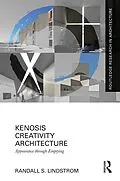Kenosis Creativity Architecture locates and explores creativity's grounding in the ancient concept of kenosis, the "emptying" that allows creativity to happen; that makes appearance possible.
It concretises that grounding through architecture-a primal expression of human creativity-critically examining, for the first time, kenotic instantiations evidenced in four iconic, international projects; works by Kahn, Pei, Ando, and Libeskind. Then, in a final turn, the potentiality of architecture's own emptying is probed. Architect and author Randall Lindstrom draws on Western and Eastern philosophy, including that of Heidegger, Levinas, Derrida, Vattimo, Nishida, and Nishitani, as well as on the theology of Christianity, Judaism, and aspects of Buddhism, Hinduism, and Islam. Every chapter expands the argument that, if responsiveness to our world is taken seriously-if proper and sustainable responses are to be realised-then a deeper understanding of creativity, and so kenosis, is essential.
This book opens-up a way of thinking about creativity and humanity's readiness to be creative. It thereby presents a crucial enquiry-at the nexus of architecture, philosophy, and theology-for researchers, graduate and postgraduate students, and practitioners alike.
Autorentext
Randall S. Lindstrom, PhD, in more than forty years of architectural practice, has served clients on four continents and received frequent recognition and awards. Since 2011, his primary focus has shifted to academic pursuits at the University of Tasmania, where he is Adjunct Lecturer in Architecture and Design.
Inhalt
Foreword-Jeff Malpas
Acknowledgements
Part One-Foundations
1. Introduction: Awaiting Kenosis
Thinking about Kenosis
Thinking about Kenosis through Architecture
Thinking about Architecture through Kenosis
2. Kenosis: A Synoptic View
Locus Classicus
Antecedents
Medieval Thinking
Modern Development and Revival
Analogous Concepts
Postmodern Radicalisation
Part Two-Manifestations
3. Modernism and Order: Kahn at the Salk Institute
Religiosity and Design
Theories in Practice
Creativity Ascribed
A Deeper Provenance
4. Post-Modernism and Empathy: Pei at the Museum of Islamic Art
Container and Contents
Cultural Translation
Situational Response
Materialisation
Dervish-ness as Kingly-ness
5. Neo-Modernism and Nothingness: Ando at the Church of the Light
Criticising Perfection
Potentiality
Receptivity
Creativity
Valorising Imperfection
6. Critical-Modernism and Kindness: Libeskind at the Jewish Museum Berlin
Illustrations versus Captions
Uncanniness
Hope
Laughter
Spectacularity and Exemplarity
Part Three-Amplifications
7. Turning Away and Turning Back: The End of Architecture
Barriers to Emptying
Emptying to Create
Grounded in Emptying
End-ing
8. Conclusion: The Grace of Dis-grace
Bibliography
Index
